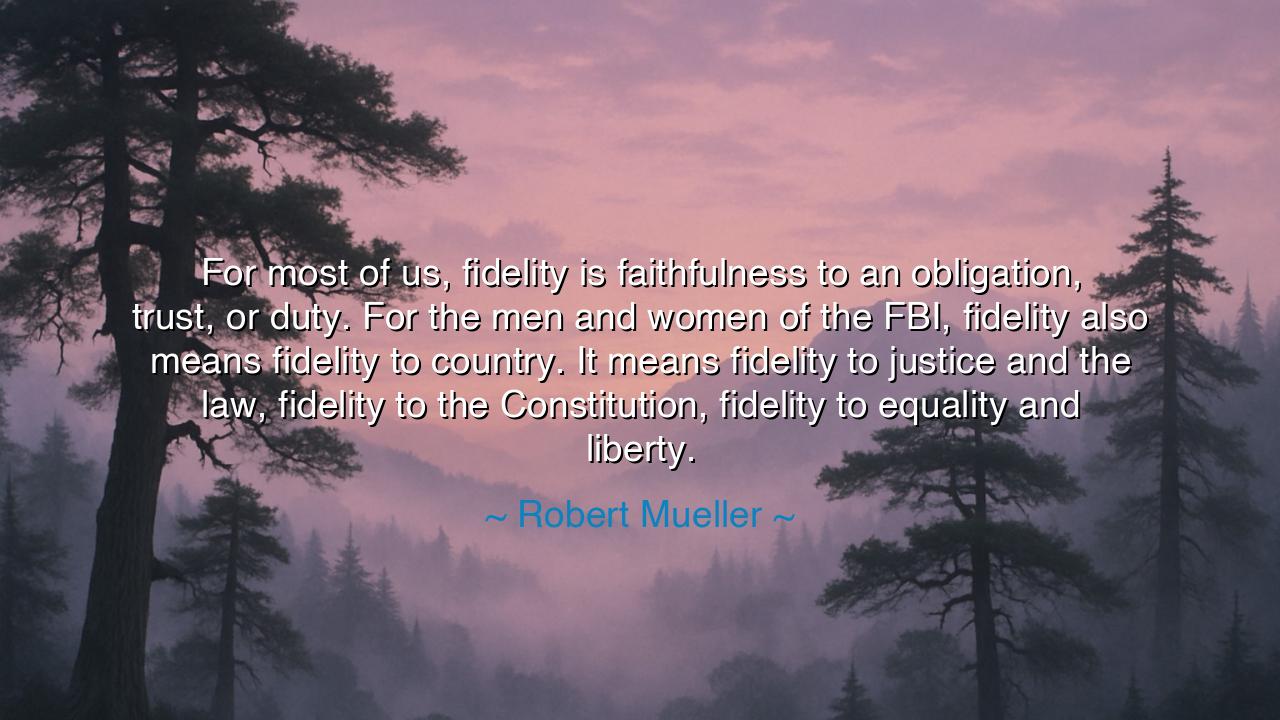
For most of us, fidelity is faithfulness to an obligation, trust
For most of us, fidelity is faithfulness to an obligation, trust, or duty. For the men and women of the FBI, fidelity also means fidelity to country. It means fidelity to justice and the law, fidelity to the Constitution, fidelity to equality and liberty.






In the solemn and commanding words of Robert Mueller, we find a vision of loyalty that rises beyond self-interest, beyond duty alone: “For most of us, fidelity is faithfulness to an obligation, trust, or duty. For the men and women of the FBI, fidelity also means fidelity to country. It means fidelity to justice and the law, fidelity to the Constitution, fidelity to equality and liberty.” These words, spoken with the restraint of a soldier and the conviction of a statesman, reveal that fidelity—true and enduring faithfulness—is not a mere feeling or personal virtue, but a sacred bond between the citizen and the nation, between conscience and law. It is the invisible thread that holds civilization together, binding each individual to something greater than themselves.
The origin of this quote lies in Mueller’s long career as Director of the Federal Bureau of Investigation (FBI), an institution built upon the very ideals he describes: Fidelity, Bravery, Integrity—the three words that form its creed. In a time when national trust was shaken by terrorism, corruption, and cynicism, Mueller sought to remind his agents and the public alike that fidelity is not passive loyalty; it is active guardianship. For the FBI, to be faithful is not to obey blindly, but to uphold the Constitution, to protect the rule of law, and to defend the liberty of all people—even when such defense demands sacrifice. Fidelity, in his understanding, is not devotion to power, but to principle.
To speak of fidelity to country is to speak of the highest form of love—patriotism of conscience rather than passion. It is not the shallow pride that boasts of a flag, but the deep humility that serves the ideals it represents. For the faithful servant of justice, allegiance is not to the ruler, nor to the faction, but to the eternal truths upon which the nation stands. Mueller’s words call forth this ancient truth: that the republic is sustained not by strength of arms or wealth of treasury, but by the honor of those who guard it. When such fidelity fails, laws become hollow, and liberty turns to dust.
History bears witness to those who lived—and died—by this creed. Consider the tale of Eliot Ness, the young agent who led the Untouchables in their battle against corruption during America’s Prohibition era. He faced threats, bribery, and isolation, yet remained steadfast, earning his title not for invincibility of body, but for incorruptibility of spirit. His fidelity was not to a government that often faltered, but to justice itself—to the ideal that law must remain unsullied by greed or fear. Such men embody what Mueller describes: fidelity to justice and the law, a devotion that demands not only courage but purity of heart.
But Mueller’s words also remind us that fidelity to equality and liberty is not the duty of agents alone—it is the calling of every citizen. A democracy cannot survive on institutions without individuals who cherish its principles. Fidelity to liberty means defending the rights of even those we disagree with; fidelity to equality means ensuring that justice is not the privilege of the powerful, but the birthright of all. The strength of a nation lies not in its monuments, but in the invisible oaths sworn daily by those who act with integrity when no one watches.
And yet, fidelity is not easy. It demands endurance in the face of temptation, and obedience to truth even when the truth is inconvenient. It is the soldier refusing unlawful orders; the journalist who speaks truth to power; the judge who honors the law above politics; the citizen who casts their vote not for comfort, but for conscience. Fidelity is tested most not in times of glory, but in the quiet choices of ordinary life. To be faithful, one must remember always that freedom is not inherited—it is guarded, renewed, and paid for by the vigilance of those who love it.
Let this teaching, then, be passed down to all who seek to serve with honor: fidelity is the highest form of courage. To be faithful is to hold steady when others yield, to keep one’s oath when silence would be easier, to serve truth above favor. Let each person ask themselves: To what am I faithful? For in that answer lies the measure of one’s character.
And thus, through the resolute words of Robert Mueller, we are reminded that fidelity is not the property of the powerful, but the virtue of the just. It is the fire that lights the path of public service, the shield that guards democracy, the silent oath that sustains the republic. To live with such fidelity is to live with purpose—to be, in one’s own way, a keeper of liberty’s covenant, a watchman of justice, and a humble servant of the truth.






AAdministratorAdministrator
Welcome, honored guests. Please leave a comment, we will respond soon